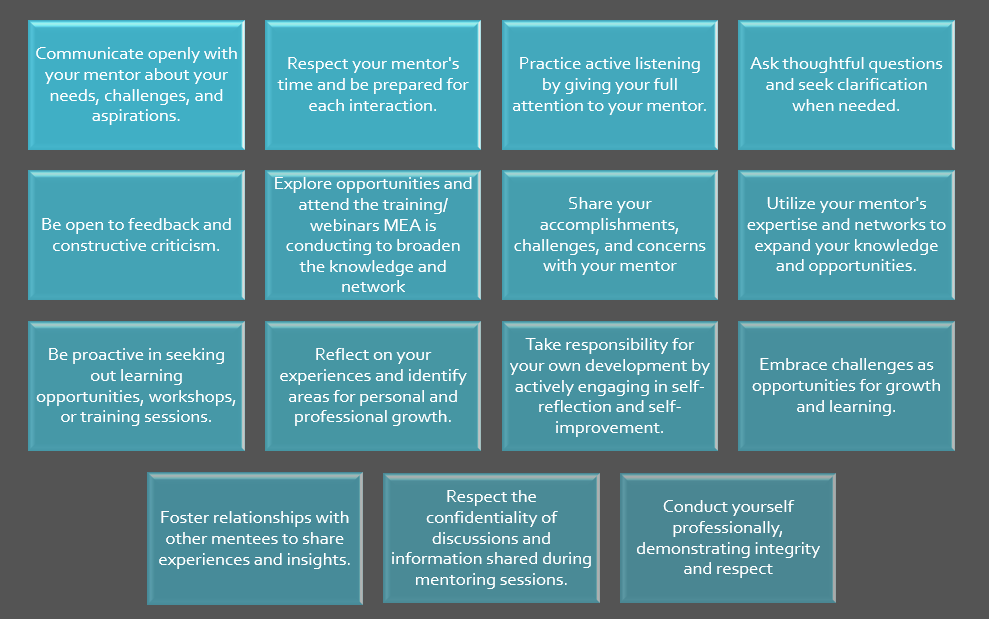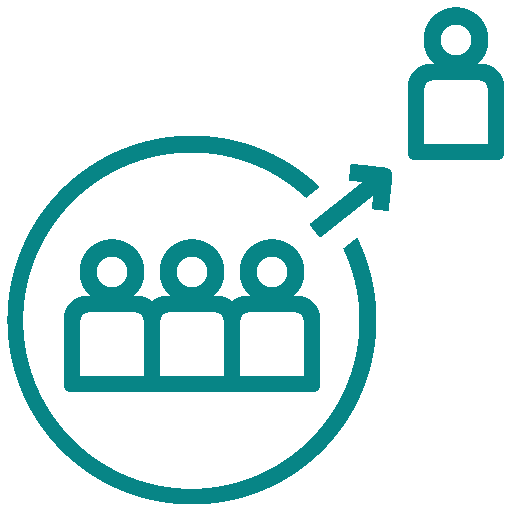Overview
The MEA Mentorship Program is a structured endeavor designed for MEA scholars to provide guidance, valuable insights, personalized advice, and emotional support throughout their academic journey. It aims to create a nurturing and inspiring environment that cultivates growth, learning, and academic excellence, thereby assisting scholars in achieving their academic and professional goals.
The Mentee Guide is specifically designed to offer guidance and support to MEA scholars. It serves as a valuable reference and tool that assists students in understanding and effectively fulfilling their role within the mentoring relationship. By utilizing the Mentee Guide, students are empowered to navigate their mentoring experience with clarity and purpose, allowing them to maximize the benefits derived from the mentorship. The guide provides valuable information, tips, and resources that enable students to actively participate in the mentoring process, seek guidance and support, set meaningful goals, enhance their learning and professional growth.




What is a Mentee
A mentee within the MEA Scholar program is the MEA scholar who seeks guidance, support, and knowledge from a designated MEA mentor.
The purpose of this mentorship is to enrich the mentee’s knowledge, refine their skills, and ultimately contribute to their academic and professional achievements.
How will Mentees and Mentors be Matched?
Mentors and mentees are carefully matched based on several criteria, including their field of study, the mentor’s experience, and, in some cases, gender considerations, taking into account the suggestions made during the matching process.
This ensures that mentees are paired with mentors who possess relevant expertise and knowledge in their specific area of interest, fostering a productive and beneficial mentoring relationship.
Guiding Principles for Mentee
Guiding principle for mentees is to actively engage and take ownership of their mentoring experience. This principle emphasizes the mentee’s responsibility to drive their own learning and growth while working in partnership with their mentor.

Be Proactive
Take initiative in your mentoring relationship by actively seeking guidance, asking questions, and expressing your goals and needs. Show enthusiasm and engagement in the mentoring process.
Take initiative in your mentoring relationship by actively seeking guidance, asking questions, and expressing your goals and needs. Show enthusiasm and engagement in the mentoring process.

Communicate openly
Maintain clear and open lines of communication with your mentor. Share your thoughts, concerns, and aspirations. Be receptive to feedback and willing to engage in meaningful discussions.
Maintain clear and open lines of communication with your mentor. Share your thoughts, concerns, and aspirations. Be receptive to feedback and willing to engage in meaningful discussions.

Listen actively
When interacting with your mentor, listen attentively and actively. Be open to feedback, suggestions, and insights they share with you. Demonstrate that you value their input by taking notes and asking for clarification or further explanation when needed.
When interacting with your mentor, listen attentively and actively. Be open to feedback, suggestions, and insights they share with you. Demonstrate that you value their input by taking notes and asking for clarification or further explanation when needed.

Be receptive to feedback
Mentoring is an opportunity for growth, and feedback is a crucial part of that process. Embrace feedback from your mentor with an open mind and a willingness to learn and improve. Use the feedback to reflect on your strengths, weaknesses, and areas for development.
Mentoring is an opportunity for growth, and feedback is a crucial part of that process. Embrace feedback from your mentor with an open mind and a willingness to learn and improve. Use the feedback to reflect on your strengths, weaknesses, and areas for development.

Take ownership of your development
Remember that the mentoring relationship is a partnership, and you play an active role in your own development. Take the advice and guidance offered by your mentor seriously and follow through on any action items or recommendations they provide.
Remember that the mentoring relationship is a partnership, and you play an active role in your own development. Take the advice and guidance offered by your mentor seriously and follow through on any action items or recommendations they provide.

Express gratitude
Show appreciation for your mentor's time, guidance, and support. A simple thank you can go a long way in acknowledging their efforts and reinforcing the positive aspects of the mentoring relationship.
Show appreciation for your mentor's time, guidance, and support. A simple thank you can go a long way in acknowledging their efforts and reinforcing the positive aspects of the mentoring relationship.
Tips for Mentee
The following tips are utilized for effective mentoring.

Dont's for Mentee
Here are some “don’ts” or things to avoid as a mentee in a mentoring relationship.

Don't be passive

Don't hesitate to ask for help

Don't ignore feedback

Don't resist stepping out of your comfort zone

Don't forget to express gratitude

Don't overlook the importance of reflection



